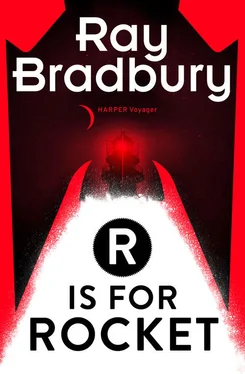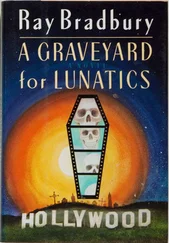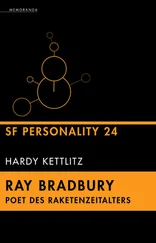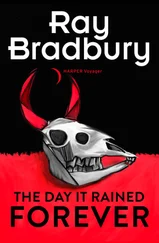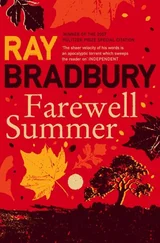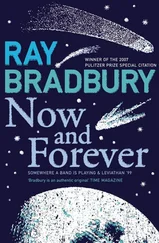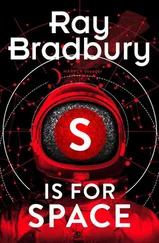I quit breathing. I didn’t even suck another breath it seemed until the rocket was way out on the concrete meadow, followed by water-beetle tractors and great cylinders bearing hidden men, and all around, in asbestos suits, praying-mantis mechanics fiddled with machines and buzzed and cawwed and gibbered to each other on invisible, unhearable radiophones, but we could hear it all, in our heads, our minds, our hearts.
“Lord,” I said at last.
“The very good Lord,” said Ralph Priory at my elbow.
The others said this, too, over and over.
It was something to “good Lord” about. It was a hundred years of dreaming all sorted out and chosen and put together to make the hardest, prettiest, swiftest dream of all. Every line was fire solidified and made perfect, it was flame frozen, and ice waiting to thaw there in the middle of a concrete prairie, ready to wake with a roar, jump high and knock its silly fine great head against the Milky Way and knock the stars down in a full return of firefall meteors. You felt it could kick the Coal Sack Nebula square in the midriff and make it stand out of the way.
It got me in the midriff, too—it gripped me in such a way I knew the special sickness of longing and envy and grief for lack of accomplishment. And when the astronauts patrolled the field in the final silent mobile-van, my body went with them in their strange white armor, in their bubble-helmets and insouciant pride, looking as if they were team-parading to a magnetic football game at one of the local mag-fields, for mere practice. But they were going to the Moon, they went every month now, and the crowds that used to come to watch were no longer there, there was just us kids to worry them up and worry them off.
“Gosh,” I said. “What wouldn’t I give to go with them. What wouldn’t I give.”
“Me,” said Mac, “I’d give my one-year monorail privileges.”
“Yeah. Oh, very much yeah.”
It was a big feeling for us kids caught half between this morning’s toys and this afternoon’s very real and powerful fireworks.
And then the preliminaries got over with. The fuel was in the rocket and the men ran away from it on the ground like ants running lickety from a metal god—and the Dream woke up and gave a yell and jumped into the sky. And then it was gone, all the vacuum shouting of it, leaving nothing but a hot trembling in the air, through the ground, and up our legs to our hearts. Where it had been was a blazed, seared pock and a fog of rocket smoke like a cumulus cloud banked low.
“It’s gone!” yelled Priory.
And we all began to breathe fast again, frozen there on the ground as if stunned by the passing of a gigantic paralysis gun.
“I want to grow up quick,” I said, then. “I want to grow up quick so I can take that rocket.”
I bit my lips. I was so darned young, and you cannot apply for space work. You have to be chosen. Chosen.
Finally somebody, I guess it was Sidney, said:
“Let’s go to the tele-show now.”
Everyone said yeah, except Priory and myself. We said no, and the other kids went off laughing breathlessly, talking, and left Priory and me there to look at the spot where the ship had been.
It spoiled everything else for us—that takeoff.
Because of it, I flunked my semantics test on Monday.
I didn’t care.
At times like that I thanked Providence for concentrates. When your stomach is nothing but a coiled mass of excitement, you hardly feel like drawing a chair to a full hot dinner. A few concen-tabs swallowed, did wonderfully well as substitution, without the urge of appetite.
I got to thinking about it, tough and hard, all day long and late at night. It got so bad I had to use sleep-massage mechs every night, coupled with some of Tschaikovsky’s quieter music to get my eyes shut.
“Good Lord, young man,” said my teacher, that Monday at class. “If this keeps up I’ll have you reclassified at the next psych-board meeting.”
“I’m sorry,” I replied.
He looked hard at me. “What sort of block have you got? It must be a very simple, and also a conscious, one.”
I winced. “It’s conscious, sir; but it’s not simple. It’s multitentacular. In brief, though—it’s rockets.”
He smiled. “R is for Rocket, eh?”
“I guess that’s it, sir.”
“We can’t let it interfere with your scholastic record, though, young man.”
“Do you think I need hypnotic suggestion, sir?”
“No, no.” He flipped through a small tab of records with my name blocked on it. I had a funny stone in my stomach, just lying there. He looked at me. “You know, Christopher, you’re king-of-the-hill here; head of the class.” He closed his eyes and mused over it. “We’ll have to see about a lot of other things,” he concluded. Then he patted me on the shoulder.
“Well—get on with your work. Nothing to worry about.”
He walked away.
I tried to get back to work, but I couldn’t. During the rest of the day the teacher kept watching me and looking at my tab-record and chewing his lip. About two in the afternoon he dialed a number on his desk-audio and discussed something with somebody for about five minutes.
I couldn’t hear what was said.
But when he set the audio into its cradle, he stared straight at me with the funniest light in his eyes.
It was envy and admiration and pity all in one. It was a little sad and it was much of happiness. It had a lot in it, just in his eyes. The rest of his face said nothing.
It made me feel like a saint and a devil sitting there.
Ralph Priory and I slid home from formula-school together early that afternoon. I told Ralph what had happened and he frowned in the dark way he always frowns.
I began to worry. And between the two of us we doubled and tripled the worry.
“You don’t think you’ll be sent away, do you, Chris?”
Our monorail car hissed. We stopped at our station. We got out. We walked slow. “I don’t know,” I said.
“That would be plain dirty,” said Ralph.
“Maybe I need a good psychiatric laundering, Ralph. I can’t go on flubbing my studies this way.”
We stopped outside my house and looked at the sky for a long moment. Ralph said something funny.
“The stars aren’t out in the daytime, but we can see ’em, can’t we, Chris?”
“Yeah,” I said. “Darn rights.”
“We’ll stick it together, huh, Chris? Blast them, they can’t take you away now. We’re pals. It wouldn’t be fair.”
I didn’t say anything because there was no room in my throat for anything but a hectagonal lump.
“What’s the matter with your eyes?” asked Priory.
“Aw, I looked at the sun too long. Come on inside, Ralph.”
We yelled under the shower spray in the bath-cubicle, but our yells weren’t especially convincing, even when we turned on the ice-water.
While we were standing in the warm-air dryer, I did a lot of thinking. Literature, I figured, was full of people who fought battles against hard, razor-edged opponents. They pitted brain and muscle against obstacles until they won out or were themselves defeated. But here I was with hardly a sign of any outward conflict. It was all running around in spiked boots inside my head, making cuts and bruises where no one could see them except me and a psychologist. But it was just as bad.
“Ralph,” I said, as we dressed, “I got a war on.”
“All by yourself?” he asked.
“I can’t include you,” I said. “Because this is personal. How many times has my mother said, ‘Don’t eat so much, Chris, your eyes are bigger than your stomach?’”
“A million times.”
“Two million. Well, paraphrase it, Ralph. Change it to ‘Don’t see so much, Chris, your mind is too big for your body.’ I got a war on between a mind that wants things my body can’t give it.”
Читать дальше
